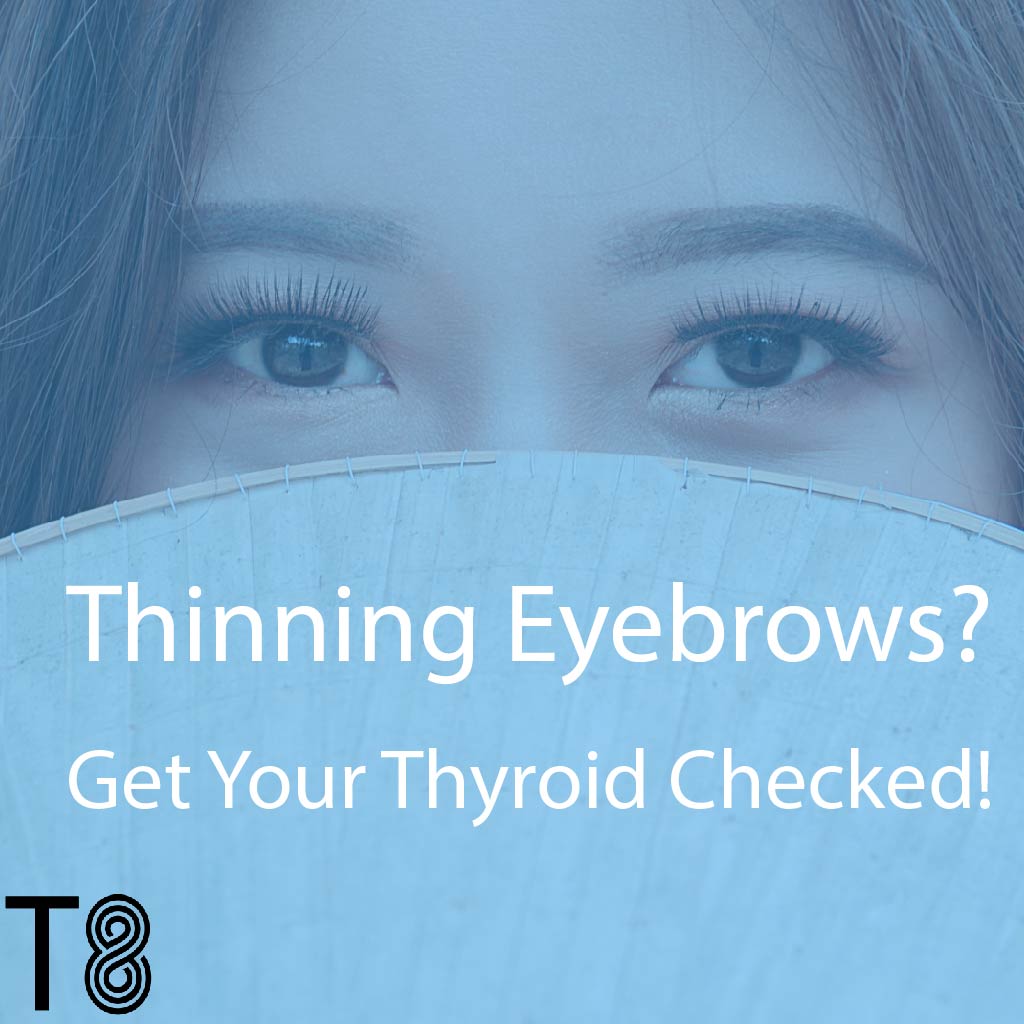The change was probably gradual, you may not have noticed when it began. Looking in the mirror now, there’s been an obvious change to your face. After a moment you realize, your eyebrows…They’re disappearing!
For many women with hypothyroidism, hair loss is a common symptom. This usually begins with the thinning of the eyebrows. Suddenly, you notice the outer portion of your eyebrow, which I like to call, “the tail,” has changed in length and fullness. This can be irritating in more ways than one. You may feel that your thinning eyebrows are changing the look of your face, as they no longer follow the lines of your brow bone to frame your eyes. This can call for some unwanted changes in your makeup routine, adding an extra 15 minutes to the time it takes you to get ready in the morning (drawing on new eyebrows isn’t easy for all of us ladies). What’s worse? Not only are you dealing with an unwanted change in your appearance, you’re also having to deal with a symptom that may be pointing to a serious health condition. If you’re experiencing hair loss from your eyebrows, it’s time to get tested. We’ve listed 5 thyroid tests you need to consider to find out whether your hair loss is related to an untreated thyroid condition.

What Is Hypothyroidism?
Before we jump in to the different thyroid tests, it’s important to understand the difference between the two common thyroid conditions, hypothyroidism and hyperthyroidism.
The thyroid is a butterfly-shaped gland located at the base of the neck. It produces hormones responsible for a variety of critical processes. These include the regulation of body temperature, metabolism, digestive function and more (you can learn more about the functions of the thyroid gland, here.) When your thyroid hormone levels are abnormal, it can lead to serious health problems. One of these is the decline of the body’s capacity for regeneration, meaning your body won’t be able to develop new hair growth.
Hypothyroidism is a thyroid condition that develops as a result of an under-active thyroid. This means that your thyroid isn’t producing enough of the T3 and T4 hormones it uses to regulate important bodily functions. There are many reasons why your thyroid may be under-active. For example, you may have an autoimmune thyroid disease called Hashimoto’s disease, the #1 cause of hypothyroidism in the U.S. Another term for this is Hashimoto’s thyroiditis. In this autoimmune disease, the thyroid antibodies attack the glands causing chronic inflammation, eventually leading to an under-active thyroid. If someone in your family has Hashimoto’s, the chances of you also having it increase.
The condition can also manifest in different forms. You may have subclinical hypothyroidism, a mild failure of the thyroid. Or, you may have thyroid nodules, lumps or swelling on the thyroid gland. While not as severe, these conditions can also manifest symptoms of weight gain, hair loss, or fatigue caused by an under-active thyroid.

What Is Hyperthyroidism?
Hyperthyroidism is a thyroid disease characterized by an overactive thyroid gland. It can have similar as well as opposite symptoms to hypothyroidism. For example, hypothyroidism can cause weight gain while hyperthyroidism may lead to sudden weight loss. Other hyperthyroidism symptoms include a rapid heartbeat, irritability, sensitivity to heat, anxiety, fatigue, fine hair, and tremors in the hands and fingers.
Like hypothyroidism, an over-active thyroid can be caused by a myriad of things. Including, inflammation of the glands, an autoimmune condition called Graves’ disease, and even a toxic multi-nodular goiter.
No matter what the cause, if you have thyroid problems, you need to fix them right away. Now that we know the two types of thyroid conditions, let’s find out what tests are necessary to properly diagnose. These lab tests can guide you and your doctor on how to manage your thyroid health.
For more information on Hyperthyroidism, check out our blog, “Coping with Hyperthyroidism Symptoms.”

5 Tests To Check Your Thyroid Health
When your eyebrows are thinning and your doctor suspects you have a thyroid issue, he or she may suggest the following:
1. TSH Test
The thyroid stimulating hormone (TSH) test stimulates the thyroid gland to produce its two hormones, triiodothyronine and thyroxine (T3 and T4). TSH is produced by the pituitary gland which communicates to the thyroid when to make and release thyroid hormones (T3 and T4). These hormones are dispersed into the blood stream where they travel to different parts of the body to control and manage important biological functions, like the metabolism. Asking for a TSH test is a basic way to learn whether or not your thyroid is functioning properly. This test can also indicate whether or not the problem lies within the pituitary gland, not the thyroid. The test is simple, only requiring a blood sample.
The normal range for TSH levels can vary depending on the lab. Usually, it’s between 0.4 and 5 mIU/L (milli-international units per liter). If your TSH levels are high, it’s normally an indication that you have hypothyroidism. However, this can also be due to other factors such as pregnancy. For this reason, you may require other tests in order for your physician to reach an accurate diagnosis.
2. Free Thyroxine (Free T4)
Thyroxine (T4) is a thyroid hormone which plays a role in several of the body’s functions. These include growth and metabolism. When produced, it’s inactive. Tissues and organs such as the liver have to convert it into the active hormone, triiodothyronine (T3). It then combines with a protein called thyroxine-binding globulin.
A free T4 test searches for the hormones that haven’t been bound to these proteins. The free hormone should make up only a small percentage in the bloodstream. Changes in the levels of production can also affect the TSH levels. For this reason, a doctor may request for this test if TSH levels are abnormal.
Results showing high levels from this test indicate that you may have an over-active thyroid, also known as hyperthyroidism. However, low levels indicate an under-active thyroid, or hypothyroidism. Many factors can affect the result. These include drugs like androgen, estrogen, and birth control pills. Make sure to inform your doctor of any medication you’re using before taking the test.

3. Free Triiodothyronine (Free T3)
The Free T3 test is mainly used to determine if someone has hyperthyroidism. This thyroid function test measures the amount of the active T3 hormone which hasn’t bonded to the protein in your blood. Together, T4 and T3 help control the rate at which the body uses energy. Results exhibiting a low TSH level with a non-elevated free T4 often indicate the presence of an over-active thyroid.
4. Thyroid Peroxidase Antibodies (TPO)
TPO is an enzyme normally found in the thyroid gland that helps in the production of thyroid hormones. This test analyzes the level of antibodies in the blood against TPO. Elevated thyroid peroxidase antibodies levels may indicate Hashimoto’s disease. TPO is an enzyme in your thyroid gland which aids in the production of thyroid hormones. This test is used to show whether you have antibodies attacking your TPO and causing your thyroid disorder.
5. Ferritin Levels
Ferritin is a protein in your blood cells which stores and releases iron in your body when needed. If your ferritin levels prove to be lower than normal, it indicates your body’s iron levels are low and you have an iron deficiency. This is important because low levels of ferritin in your body can cause hypothyroidism. Iron is a necessary nutrient used in the process of converting inactive T4 hormones into active T3 hormones. All it takes is a simple blood test to find out if your ferritin levels are normal, too high, or too low.
The Takeaway
When you’re experiencing symptoms related to a thyroid condition, such as hair loss, it’s important to have the necessary tests taken as soon as possible. The sooner your physician is able to diagnose you, the sooner you’ll be able to begin treatment to manage your condition. These tests can also indicate the severity of the condition or if there are other causes for your hair loss.While you can choose which of these thyroid function tests to take, it’s best to consider the three essential ones. These are TSH, free T4, and T3. Together, these tests provide a more accurate range of reference to give you a better picture of your thyroid health.

